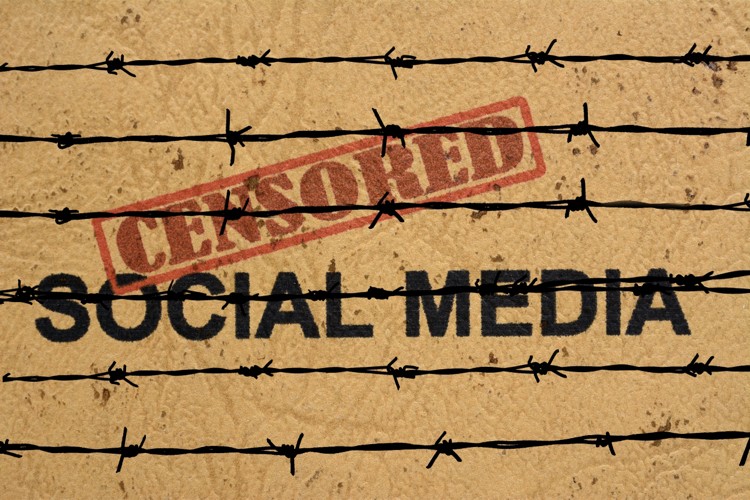Trump Announces Lawsuits Against Big Tech Companies over Censorship

The New American - Raven Clabough - July 8, 2021
President Donald Trump announced Wednesday that he is filing class-action lawsuits against three Big Tech companies over censorship issues, the Washington Post report.
“Today in conjunction with the America First Policy Institute, I’m filing as the lead class representative, a major class-action lawsuit against the big tech giants, including Facebook, Google, and Twitter, as well as their CEOs, Mark Zuckerberg, Sundar Pichai, and Jack Dorsey, three really nice guys,” Trump said during a press conference at his property in Bedminster, New Jersey. “We’re asking the U.S. District Court for the Southern District of Florida to order an immediate halt to social media companies’ illegal, shameful censorship of the American people, and that’s exactly what they are doing.”
Trump’s social media accounts were shut down by several Big Tech firms after the companies claimed his rhetoric on the validity of the 2020 election contributed to the January 6 Capitol protests. Twitter’s ban of Trump’s account is permanent, while Facebook imposed a two-year ban. YouTube’s ban is indefinite, with the Google-owned site claiming it will end once “the risk of violence has decreased.”
According to the lawsuits, Facebook, Twitter, and YouTube violated the former president’s First Amendment rights when they suspended his accounts. And while the First Amendment traditionally applies to governmental actions, the lawsuits contend the Big Tech companies are “state actors” and “de facto censorship arm[s]” of the government and should no longer be treated as private companies.
The lawsuits also ask the court to strike down Section 230, an Internet law that protects tech companies from lawsuits over decisions related to moderation.
Enacted in the 1990s, Section 230 provisions were intended to protect children from harmful online content, the Epoch Times reported. But critics of Section 230 contend Big Tech firms have since used the law as a shield.
“While the social media companies are officially private entities, in recent years they have ceased to be private with the enactment and their historical use of section 230, which profoundly protects them from liability,” Trump added during his press conference. “Once they got section 230, they’re not private companies anymore in a lot of views. No other companies in our country, and even in our country’s history, have had protection like this. It’s, in effect, a massive government subsidy. These companies have been co-opted, coerced, and weaponized by government and by government actors to become the [enforcers] of illegal, unconstitutional censorship. And that’s what it is at the highest level, censorship.”
Trump’s statement also referenced a phenomenon experienced by nearly all social-media users who espouse more conservative or alternative beliefs on social media: shadow banning.
“We’re demanding an end to the shadow banning, a stop to the silencing, and a stop to the blacklisting, banishing, and canceling that you know so well. Our case will prove this censorship is unlawful, it’s unconstitutional, and it’s completely un-American,” Trump claimed. “Our filing also seeks injunctive relief to allow prompt restitution and really restoration, and you can name about 20 other things, and it has to be prompt because it’s destroying our country. Of my accounts, in addition, we are asking the court to impose punitive damages on these social media giants. We’re going to hold big tech very accountable.”
The New American’s Alex Newman wrote of social media’s “shadow-banning” efforts in 2018, asserting it was one of many techniques used by the “globalist Deep State” in response to President Trump’s presidential victory in 2016, which shocked those on the Left who believed their dominance in mainstream media was enough to spin the narrative in a way that would have resulted in a Hillary Clinton presidency. Newman predicted how far Big Tech would work to silence conservative thought in the wake of a Trump presidency:
A new narrative was born: Trump won only because dumb, racist Americans were influenced by “fake news” and Russian disinformation, much of it spread on social media. Clearly, a solution to this needed to be found. And so, among other tactics, the globalist-controlled Internet giants, most of which have been in bed with government from the start, began stepping up their efforts to control the narrative. Those schemes included hiding alternative voices via “shadow-banning,” promoting establishment voices via manipulated algorithms, and eventually, outright banning those who question the establishment’s narrative too vigorously or successfully.
Even the social media accounts of an American president were not safe from these over-zealous efforts. And the banning of these accounts continues to be defended by Big Tech and the Left.
Trump said the lawsuits are the “first of numerous” ones and hopes they will be a “game-changer … in the defense of the First Amendment,” the Daily Wire reported.
COPYRIGHTS
Copy & Paste the link above for Yandex translation to Norwegian.
WHO and WHAT is behind it all ? : >
The bottom line is for the people to regain their original, moral principles, which have intentionally been watered out over the past generations by our press, TV, and other media owned by the Illuminati/Bilderberger Group, corrupting our morals by making misbehaviour acceptable to our society. Only in this way shall we conquer this oncoming wave of evil.
Commentary:
Administrator
HUMAN SYNTHESIS
All articles contained in Human-Synthesis are freely available and collected from the Internet. The interpretation of the contents is left to the readers and do not necessarily represent the views of the Administrator. Disclaimer: The contents of this article are of sole responsibility of the author(s). Human-Synthesis will not be responsible for any inaccurate or incorrect statement in this article. Human-Synthesis grants permission to cross-post original Human-Synthesis articles on community internet sites as long as the text & title are not modified